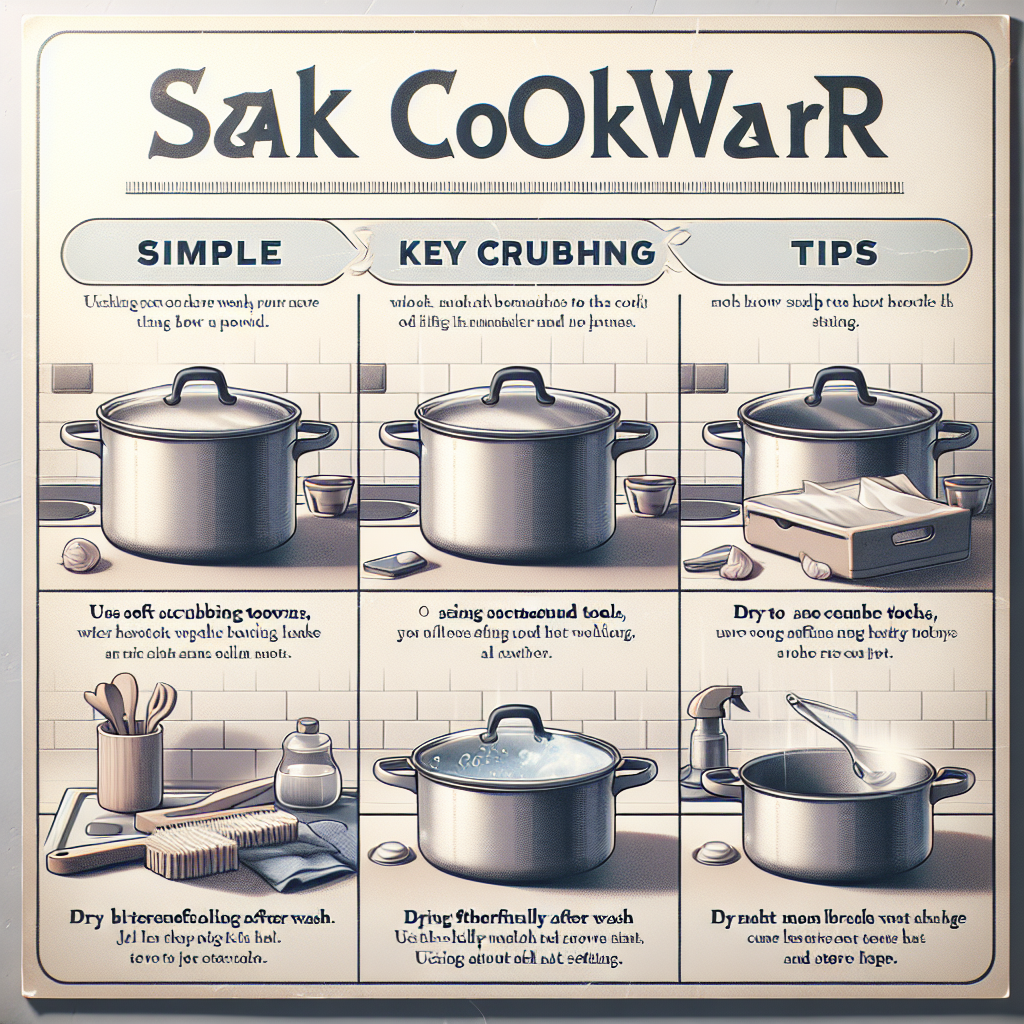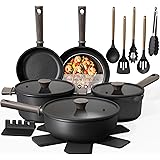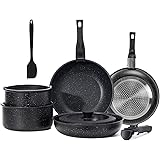Some suggestions to consider!
CAROTE 21Pcs Pots and Pans Set, Nonstick Cookware Sets, White Granite Induction Cookware Non Stick Cooking Set w/Frying Pans & Saucepans(PFOS, PFOA Free)
31% OffAstercook Non Stick Pots and Pans Set, Healthy Non-Toxic Titanium Induction Kitchen Cookware Sets for Cooking with Frying Pans, PFAS/PTFE/PFOA & PFOS Free, Black, 19 Pcs
$79.99 (as of February 26, 2026 10:31 GMT +00:00 - More infoProduct prices and availability are accurate as of the date/time indicated and are subject to change. Any price and availability information displayed on [relevant Amazon Site(s), as applicable] at the time of purchase will apply to the purchase of this product.)Sweetcrispy 12 pcs Pots and Pans Set, Nonstick Kitchen Induction Cookware Suit with Detachable Handle, Dishwasher Oven Safe, Black
$29.99 (as of February 26, 2026 10:31 GMT +00:00 - More infoProduct prices and availability are accurate as of the date/time indicated and are subject to change. Any price and availability information displayed on [relevant Amazon Site(s), as applicable] at the time of purchase will apply to the purchase of this product.)
Choose the Right Cookware for Your Cooking Style
Understand Material Differences
Let’s be real, the type of cookware you use can make a huge difference in how long it lasts. There’s an array of materials out there—stainless steel, cast iron, non-stick, and more. Each one has its own quirks. For instance, I love my cast iron skillet, but it takes a little extra TLC. Non-stick looks appealing with its easy cleanup, but misuse can lead to scratches that shorten its lifespan.
When I shop for cookware, I consider not only how I cook but how much effort I’m willing to put into maintenance. If you want something durable (and don’t mind a bit of weight), stainless steel is usually a champ. However, if you’re inclined towards quick meals, non-stick could be a better fit—just know how to handle it!
So, before you buy, take a moment to research which materials suit your style. Trust me; investing in the right material pays off big in the long run. You don’t want to be replacing pots and pans every year, right?
Proper Care and Cleaning Methods
Don’t Overlook the Basics
Okay, let’s chat about cleaning. I used to think that all I needed was soap and water, but oh boy, was I in for a surprise! Each type of cookware has its own cleaning preferences. For example, with non-stick pans, using those harsh scrubbers is a big no-no. Instead, I gently use a soft sponge and warm, soapy water to do the trick.
For stainless steel, sometimes a bit of elbow grease is required, but it shines like a superstar if you know how to polish it right. After cooking, I let my pans cool down a little before washing them. Sudden temperature changes can warp them and ruin that perfect shape. Believe me, no one wants a lopsided pot!
Also, don’t forget about drying! I always make sure to dry my cookware thoroughly to prevent rust, especially with my cast iron. After I clean it, I put it on the stove for a minute or two—just enough to evaporate any lingering moisture before adding a light coat of oil.
Avoiding Food Build-Up
The Importance of Immediate Cleaning
As much as I love my gourmet meals, sometimes things get messy. One of my biggest lessons was realizing that letting food build up can ruin even the best cookware. As soon as I’m done cooking, I make it a habit to clean up any spills or splatters right away. It sounds simple, but trust me, this really cuts down on the scrubbing I have to do later!
Another key tip? Don’t let your pans sit with food in them. It’s tempting to just walk away and let them soak, but that can lead to sticky foods becoming permanent residents on my pans. I’d rather spend a few moments cleaning than hours battling burnt-on remnants!
And let’s not forget about things like tomato sauce—those can stain! If I’m making, say, a marinara, I’ll rinse it out immediately. A little effort goes a long way in preserving the integrity of my cookware, and it saves me from having to replace those bad boys prematurely.
Using Cookware Wisely
Following Heat Guidelines
One day I was in a rush and cranked the heat WAY too high on my non-stick skillet. Let me tell you, it didn’t end well. Learning to use cookware on appropriate heat levels is crucial! For example, with stainless steel, I often start on medium heat, gradually increasing it as needed. It cooks evenly without damage.
Non-stick? That’s delicate territory—I keep the heat lower and avoid preheating that heavily. High temperatures can not only warp them but also release harmful chemicals. Not cool! Knowing your cookware will make a significant difference in its longevity.
In addition to temperature, the types of utensils I use matter too. I’ve learned to avoid metal utensils on my non-stick and wooden ones on cast iron unless seasoned correctly. Having the right tools prevents scratches and maintains that beautiful cook surface. Seriously, your cookware will thank you!
Store Cookware Properly
Organizing Your Kitchen Space
It took me a while to figure out how crucial proper storage is for cookware longevity. Initially, I would stack my frying pans on top of each other, which caused scratches and dents. Now, I use protective liners or even a dish towel between them. It’s a little extra effort, but it pays off!
I’ve also moved to hanging some of my pots and pans. This way, they’re easily accessible, and they don’t risk getting nicked or scratched. Plus, it adds a nice aesthetic to my kitchen—bonus points for style!
And let’s not forget about lids! I used to toss them in with the pans, which often led to chaos. Now I have a dedicated drawer for them so they don’t get knocked around. Trust me, your cookware will last longer with a bit of organized love!
FAQs
1. How often should I clean my cookware?
I recommend cleaning your cookware after each use. This helps prevent food build-up and maintains quality.
2. Can I use metal utensils on non-stick cookware?
Nope! Metal utensils can scratch the surface of non-stick pans. Stick to silicone or wooden utensils instead.
3. How do I remove stubborn stains from my cookware?
For stains, a paste of baking soda and water can work wonders. Let it sit for a while before scrubbing!
4. Is it okay to put my cookware in the dishwasher?
It depends on the material! Always check manufacturer guidelines—many non-stick and cast iron pieces are best washed by hand.
5. How can I prevent rust on my cookware?
To prevent rust, make sure to dry cookware thoroughly after washing and consider applying a light coat of oil, especially on cast iron.








